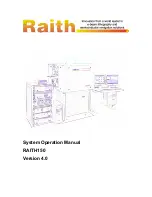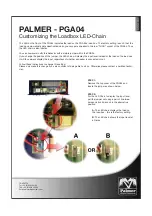
25
WARNING
It may become necessary to energize the SR-98 to properly troubleshoot some of
the outputs. The technician must take all applicable safety precautions for
working on energized circuits.
NOTES
Before suspecting a failure in the SR-98, review the
Description of Controls and
Instrumentation
and
Theory of Operation
sections to ensure that the problem is not a
result of operating error.
Preliminary testing of the SR-98 within its specified limits can help determine if a
malfunction actually exists, identify the type of malfunction and define the general area
of the failure. In many cases, the SR-98 will identify what the problem is and display an
alarm description on the display screen, see
Alarm Descriptions
.
Common causes of malfunctions, other than improper operation are, incorrect power
input (voltage above or below specified limits), incorrect test signal voltages applied to
the Timer Monitor/Start/Stop gates (outside of the specified AC/DC Applied/Removed
limits), and contact or circuit resistance too great for the Dry Contact gates to operate
properly on the Monitor/Stop gate. Other common causes are blown or tripped fuse(s),
cracked, broken or corroded wiring connections.
Power Input
Input voltage affects the whole unit and may or may not cause permanent damage if
voltage is incorrect. These problems can often be corrected by simply using a better
source of input power. See rated voltage on front panel of unit.
Some symptoms are as follows:
1.
Low voltage: Erratic operation, no output, fuse operation.
2.
High voltage: Fuse operation, power supply failure.
Basic troubleshooting of the input power and front panel controls are as follows.
1.
No
power:
Check power source and line cord.
Check mains input fuse(s).
Display blackout could be a power supply failure, or loose connection
between printed circuit boards.
WARNING: If display is blacked out,
but the output(s)-energized lamps are lit, the output(s) are energized.
To check the power supply connections, remove the unit from the chassis
(see ‘Removal of Chassis’ below).
2.
Erratic output voltage or current:
Individual output voltage or current not available.
Summary of Contents for SR-98
Page 93: ...87...
















































